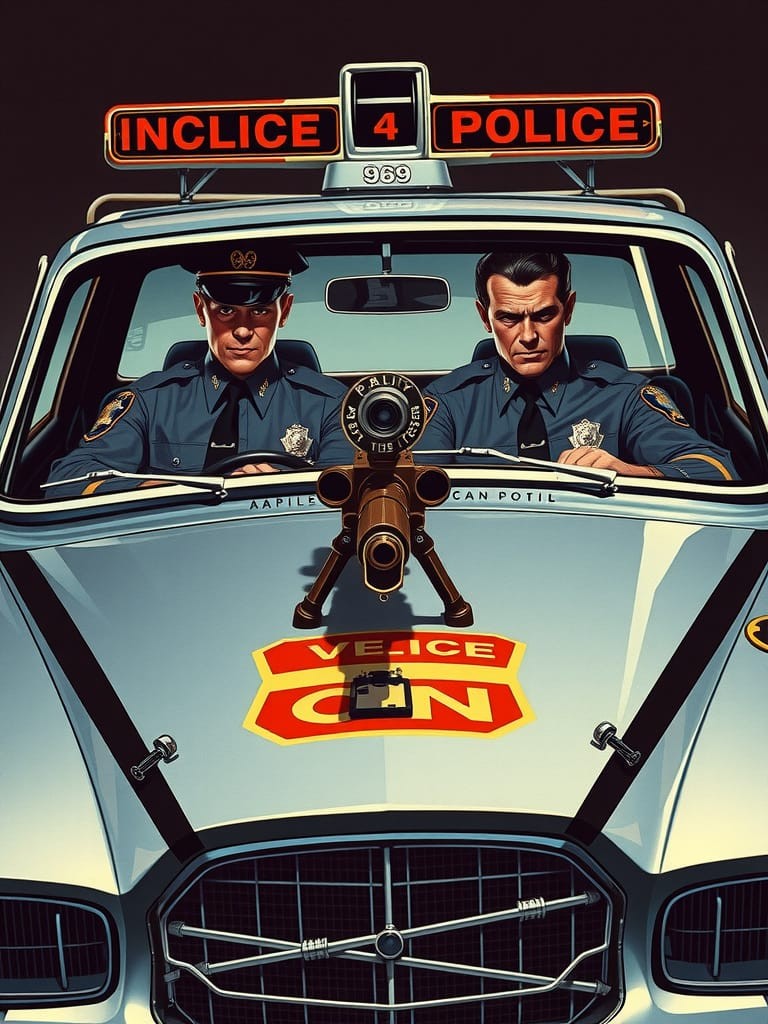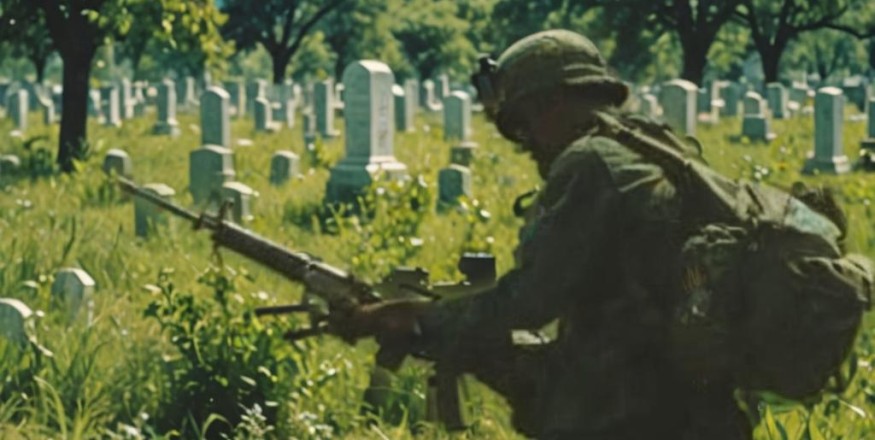 x
x
"I made Night of the Living Dead to scare people, not to give the government a damn playbook. But here we are—half the country fighting for its life, the other half shopping like nothing’s wrong. Zombies outside the wire, milkshakes and matinees inside. It’s not the end of the world, just the end of pretending we’re one nation." — George A. Romero, 1969.39Please respect copyright.PENANA5QJkxrwDBh
39Please respect copyright.PENANAiNFFn3Ci3d
39Please respect copyright.PENANAcboPpYITzq
Unlike the mindless hordes they were up against, the average soldier was a walking ad for the latest offshoots of NASA. They were looped, draped, or hung with the newest Western tech—gizmos designed to give them an edge against an enemy that never slept. Meanwhile, just beyond the barricades, civilians strolled through supermarket aisles, filling carts with goods the troops could only guard, never touch. Mail-order catalogs taunted them too, pages filled with comforts they weren’t allowed to order, for reasons no one ever explained.
They were equipped to do a job: command had all the big toys to support them, plus the computers telling everyone—especially themselves—that they were winning or at least glimpsing some light at the end of the tunnel. I always wondered whose tunnel, since Eureka had a network of underground ruins stretching out past the edge of town—no one had ever mapped them, and no one who went in ever came back. People only heard the rumors, the ugly whispers about what moved in the dark. The rotters relied on sheer numbers, mindless hunger, and something else—something no one could quite explain. The LAPD had Anton LaVey, self-proclaimed High Priest of the Church of Satan, under surveillance, convinced he knew more than he let on. There were stories, wild theories about rituals and occult forces, but nothing anyone could prove. And yet, somehow, there were those who insisted the rotters had the right to win. After all, wasn’t it Dr. Martin Luther King Jr. who once said that even the living dead, in their own tragic way, were still our fellow human beings?39Please respect copyright.PENANAACPovcmrea



You could never tell where the next threat would lurch out of the shadows. Even the authorities had stopped trying to count the zombie attacks. The more gear you had, the better your odds of making it through the night. The poor cops, stuck patrolling most of the Northern Quadrant of Mississippi—a stretch of land that rolled up into the hills near the Arkansas border—got whatever leftovers the other units didn’t want. The Special Response Teams, the Survival Scouts, the Z-Force got the good stuff. If you knew the right people and had something worth trading, even a brick of Ektachrome scrounged from the Time/Life bunker fridge could turn into a PRC 25 radio—the Cadillac of comms, top-of-the-line high fidelity. You could practically patch through to D.C. from a rotting wheatfield in no-man’s-land, or at the very least, call down fire from the heavens. On the black market, you could score a hot chopper, a case of combat suppressants, or maybe even a Patrol Boat that “fell off a truck” somewhere between supply and slaughter.39Please respect copyright.PENANAzLBBps9WuK





America’s youthful allies—exchange soldiers from Britain, France, West Germany, and even Sweden—guarded the vital lines of supply from port to PX. You could order a Jeep or a color TV before it even landed stateside: a fully computerized black market humming in the shadows. And if the rotters didn’t snag enough gear out in the war zones, they could always count on something falling off the back of a truck in the next town over.
Our guys spent a lot of time stripping Levi’s off the KIA—they traded better than ammo in some units—brought straight back to the desk jockeys and supply kings who ran their empires out of back rooms near the bases. There, ice-cold beer, thick steaks, and syrupy malteds dulled the sharp edges of the dry heat and the high-strung nerves of chopper rides.
The machines made it all feel strangely normal—anodized black aluminum stereos, Leicas with German precision, slick little gadgets that made you forget what you were doing there in the first place. They made you want to be a kid again. Or at least an enterprising teenager with just enough hustle to survive the end of the world.
Among the in-crowd—a tight core of seasoned press heads who actually saw and understood what was unraveling out there—there was a kind of mania for having the latest field gear. Didn’t matter if it was a Texas Ranger poncho, a 9th Division Recondo D-ring, or a pilot’s survival K-Bar knife complete with scabbard, sharpening stone, and safety lanyard. Everyone wanted to look squared away, even when the world wasn’t. Jake Harmon and Eddie Vance once had a running competition to see who could collect the most bars of C4 plastique scavenged from busted convoys and half-eaten resupply dumps. Neither one ever made it back from the Greenbelt Siege. Officially, they’re still listed as MIA. Unofficially? The zone ate them whole.
When the Army units at the press center caught on, they ditched their standard canopies and started using flare chutes instead. It took a certain madness—ducking into hot zones just to grab spent parachutes—but those things made damn fine ceiling drapes. Out there in the thick of it, weighed down with gear and adrenaline, everyone fed their inner Biggles. So many of the tools of survival had this raw, seductive appeal—the polished edge of lethal design, the fantasy of control in chaos. It was ego wrapped in olive drab, power in black steel. Life and death, split second. The ultimate ride. The last perfect wave—on a tricked-out board carved for war.
I'm not sure if most of us—even during the height of all that soul-searching between the so-called hawks and doves—weren’t really out there mostly for the hell of it. For the kicks. For the rush. For the brush with everything that was darkest, most sacred, most obscene. Maybe, in the end, we were there because we had to be. Because it was here. Because the dead had risen, and someone had to look them in the eyes.
At least you could make the most of it. It was the only war we had, and we were neck-deep in it—trapped, entangled, alive in it. The camaraderie, the sheer adventure of it all, were the biggest forces that ever tore through our hearts and minds. No ideology could match the intensity of living on the edge in a country divided between barricaded neighborhoods and strip malls playing the latest Four Tops record.39Please respect copyright.PENANAODHKyRipul
























